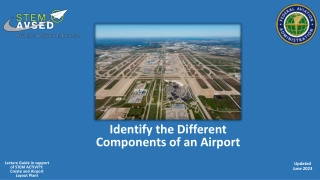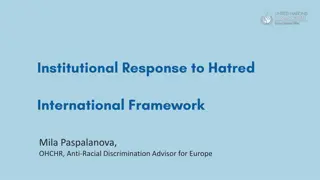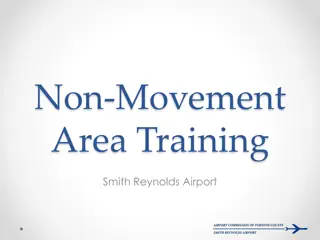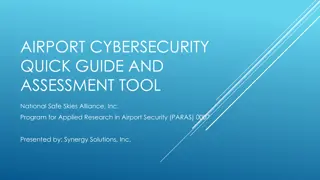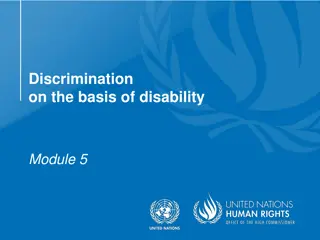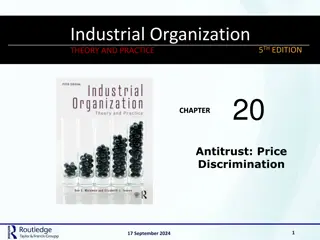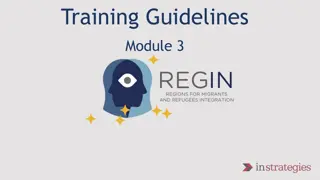Riz Ahmed's Reflections on Identity, Discrimination, and Airport Security
Riz Ahmed, a British actor, shares his experiences growing up in the UK as someone with a Pakistani background. Through auditions and personal encounters, he reflects on the ever-changing labels and struggles faced by minorities in British society. He highlights incidents of discrimination, including unsettling encounters with airport security post-9/11. Despite challenges, Ahmed finds solace in acting as a means to challenge stereotypes and humanize marginalized communities.
Download Presentation

Please find below an Image/Link to download the presentation.
The content on the website is provided AS IS for your information and personal use only. It may not be sold, licensed, or shared on other websites without obtaining consent from the author. Download presentation by click this link. If you encounter any issues during the download, it is possible that the publisher has removed the file from their server.
E N D
Presentation Transcript
Resources YouTube clips lined up Riz Ahmed text ( doc blown up to A3)
Friday, 04 October 2024 Airports and Auditions LOs To develop our understanding of how to approach unfamiliar texts To explore how a writer communicates their message effectively to the reader Starter: What do you think some of the concerns or problems of someone who isn t white living in the UK today might be? What issues/problems might they face? What worries might they have?
Airport Security Watch the two videos What does Riz Ahmed have to say about 1. Airport Security checks? 2. Some issues he has had growing up in modern Britain as someone who has a Pakistani family?
Lets read the article together Reading steps: 1. Divide the text into 3 sections 2. Read each section carefully 3. Next to each section, write a quick summary of what the writer has said 2 bullet points
To begin with, auditions taught me to get through airports. In the end, it was the other way around. I m an actor. Since I was a teenager I ve had to play different characters, negotiating the cultural expectations of a Pakistani family, Brit-Asian rudeboy culture and a scholarship to private school. The fluidity of my own personal identity on any given day was further compounded by the changing labels assigned to Asians in general. As children in the 80s. When my brother and I were stopped near our home by a skinhead and a knife was put to his throat, we were black. A decade later the knife to my throat was held by another paki , a label we wore with swagger in the Brit-Asian subculture and gang culture of the 90s. The next time I found myself as helplessly cornered, it was in a windowless room at Luton Airport. My arm was in a painful wrist-lock and my collars pinned to the wall by British intelligence officers. It was post 9/11 , and I was now labelled a Muslim. As a minority, no sooner do you learn to polish and cherish one chip on your shoulder, it s taken off you and swapped out for another. The jewellery of your struggles is forever on loan, like Koh-i-Noor. You are intermittently handed this Necklace of labels to hang around your neck, neither of your choosing nor making, both constrictive and decorative. Part of the reason I became an actor was the promise that I might be able to help stretch these Necklaces, and that the teenage version of myself might breathe a little easier as a result. If the films I re-enacted as a kid could humanise mutants and aliens, maybe there was hope for us. My first film was Michael Winterbottom sThe Road to Guantanamo. It told the story of a group of friends from Birmingham who were illegally detained and tortured there. When it won a prestigious award at the Berlin Film Festival, we were euphoric. For those who saw it, the inmates went from orange jumpsuits to human beings. But airport security hadn t got the memo. Returning to the glamour of Luton Airport after the festival win, ironically named British intelligence officers frog marched me to an unmarked room where they insulted, threatened, then attacked me. What kinda film you making? Did you become an actor to further the Muslim struggle? an officer screamed, twisting my arm to the point of snapping. It turned out that what those Special Branch officers did was illegal. I was asked by an activist lawyer if I wanted to sue, but instead I wrote an account of the incident and sent it to a few journalists. A story about the illegal detention of the actors from a film about illegal detention turned out to be too good to ignore. I was glad to shed some light on this depressing state of affairs.
Read back through the article 1. Highlight every time he mentions a Necklace . What does he mean when he talks about this Necklace ? 2. Now highlight every place where you think humour is being used. Annotate explaining how it is humorous and why you think Ahmed is using humour here what effect does it have? 3. Re-read the first 4 paragraphs and the last 6 paragraphs (from The last kid who searched me ). What connections can you find from the beginning of the article to the end? Why do you think Riz Ahmed has done this?
What does Riz Ahmed say about his experience of being Muslim in Britain and how does he express his experience to the reader? 1. Highlight the key words in the question what is it asking you to do? 2. Planning time: find at least 2 quotes to support your answer for the first part (what) 3. Now find at least 2 quotes to support your answer for the second part (how)
What does Riz Ahmed say about his experience of being Muslim in Britain and how does he express his experience to the reader? When the writer writes this suggests that his experience of being Muslim in Britain is __________ because The word / phrase / adjective makes me think of and suggests that the writer thinks
Proof reading: Steps to Success 1. Read it through once to check I have completed the task. 2. Read it again does it make sense? Are all the words in the right order? Have I missed out any words? Have I stayed in the same tense throughout? 3. Read it through again have I got punctuation? Have I missed any full stops? 4. Final reading check your spelling. Are there any words you are not sure about?
Put your partners book on top of yours one pen peer assessment Kind Don t forget to write at the bottom one thing you felt worked really well in their article and one improvement you can suggest I really like the way you Excellent throughout. The most successful thing about this was I enjoyed reading this because It was especially good when you Specific In the first / second / third paragraph I think is quite difficult to understand / could be explained better / could include more detail etc. Your sentence / paragraph about was because Helpful (refer to success criteria) Think about adding a Think about taking away a Have you thought about ? To improve your try Perhaps you could

 undefined
undefined
